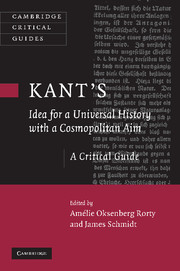Book contents
- Frontmatter
- Contents
- List of contributors
- List of abbreviations
- Introduction: history as philosophy
- Idea for a Universal History with a Cosmopolitan Aim
- 1 Teleology and history in Kant: the critical foundations of Kant's philosophy of history
- 2 The purposive development of human capacities
- 3 Reason as a species characteristic
- 4 Good out of evil: Kant and the idea of unsocial sociability
- 5 Kant's Fourth Proposition: the unsociable sociability of human nature
- 6 The crooked timber of mankind
- 7 A habitat for humanity
- 8 Kant's changing cosmopolitanism
- 9 The hidden plan of nature
- 10 Providence as progress: Kant's variations on a tale of origins
- 11 Norms, facts, and the philosophy of history
- 12 Philosophy helps history
- Bibliography
- Index of names and works
5 - Kant's Fourth Proposition: the unsociable sociability of human nature
Published online by Cambridge University Press: 28 July 2009
- Frontmatter
- Contents
- List of contributors
- List of abbreviations
- Introduction: history as philosophy
- Idea for a Universal History with a Cosmopolitan Aim
- 1 Teleology and history in Kant: the critical foundations of Kant's philosophy of history
- 2 The purposive development of human capacities
- 3 Reason as a species characteristic
- 4 Good out of evil: Kant and the idea of unsocial sociability
- 5 Kant's Fourth Proposition: the unsociable sociability of human nature
- 6 The crooked timber of mankind
- 7 A habitat for humanity
- 8 Kant's changing cosmopolitanism
- 9 The hidden plan of nature
- 10 Providence as progress: Kant's variations on a tale of origins
- 11 Norms, facts, and the philosophy of history
- 12 Philosophy helps history
- Bibliography
- Index of names and works
Summary
Kant's Idea for a Universal History with a Cosmopolitan Aim presents an “idea” in Kant's technical sense of the term, namely, an a priori concept of reason (KrV A 312–38/B 368–96). The proper function of such concepts, in theoretical matters, is to regulate our rational inquiry with the aim of achieving maximal completeness and systematicity among our cognitions (KrV A 515–67/B 543–95, A 643–704/B 670–704732, A 832–51/B 860–79). Kant conceives of a rational system of cognitions as one in which reason sketches, in accordance with an idea, what it would be for our cognitions to attain to the greatest conceivable unity, systematicity and intelligibility, and then makes empirical inquiries, ordering the results in such a way as to fill in the sketch as far as the facts of nature and the limits of our cognitive capacities make this possible. In this essay, the topic is human history, and the idea in question is therefore an idea of a maximal theoretical intelligibility to human history. The results of this project may converge (as they finally do in the Ninth Proposition) with our practical strivings, motivated by moral considerations. But to regard Kant's main project in Idea for a Universal History as motivated by morality is totally to misunderstand the essay from the ground up.
PRELIMINARY: KANT'S FIRST THREE PROPOSITIONS
Human history is the collective result of people's free actions.
- Type
- Chapter
- Information
- Kant's Idea for a Universal History with a Cosmopolitan Aim , pp. 112 - 128Publisher: Cambridge University PressPrint publication year: 2009
- 16
- Cited by

